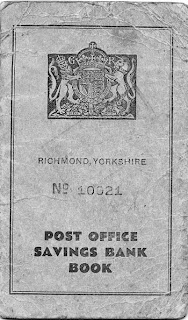

I remember Post Office savings books from my childhood in the 1970s. They were still a big part of everyday life then, providing an easily accessible and "safe" way to save money.
And right from it's creation in 1861, "safety" was the watch word of the The Post Office's Savings Bank (POSB). Understandably so as the previous decades had seen a number of high profile bank failures in Britain, in which people had lost their savings.
The PSOB allowed even those without sufficient money to open a standard bank account to save and to have their savings guaranteed by the government.
These savings books belonging to my great aunt - Lillian Barton (nee Thompson) - show how actively the savings accounts were used.
The account was originally opened in Richmond, Yorkshire in 1935 after Lillian's marriage and show deposits between 3 and 6 deposits a year of never more than £7 (£200 today) at a time and sometimes less than £1 (£18). There were withdrawals, but through small savings she had by the beginning of 1951 saved £173, the equivalent of £4,670 in today's money.
In 1951 this pattern of use completely changed and the equivalent of almost £4,000 was withdrawn from the account at branches near to the house of Lillian's sister Nancy in Upminster, Essex. I am merely guessing here - but it appears that Lillian may have used the nest egg provided by her earlier thrift to walk away from an unhappy marriage.
If you're interested in finding out more about British postal history check out the British Postal Museum and Archive and if you enjoyed this post do come and talk history and genealogy on Twitter.

What a great idea, to use the post office for savings. The U.S. Postal Service should take a lesson as yesterday they announced they are dropping Sat. delivery after 150 years!
ReplyDeleteOur delivery service is an altogether other matter - not great!
DeleteThat's a wonderful bit of history and a great resource to explore.
ReplyDeleteThanks!
We've inherited quite a pile of them and they do provide fascinating insight into families' lives
Delete